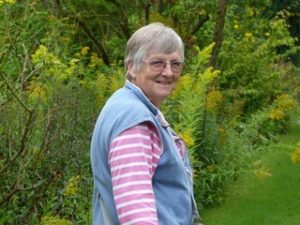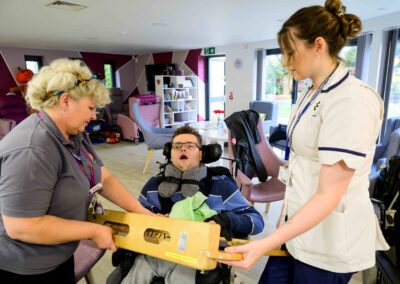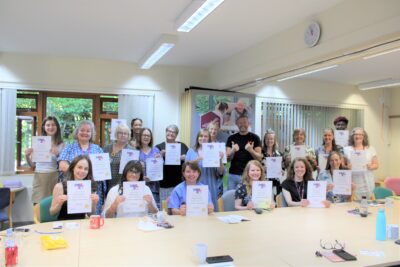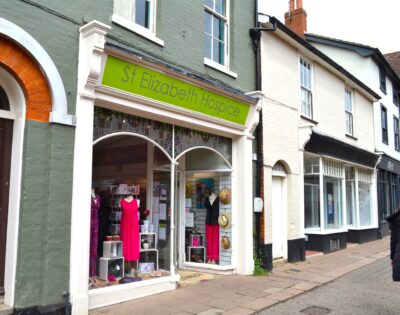Sue Hedger’s son, Andrew’s story

Every year UK hospices support more than 225,000 people with terminal and life-limiting conditions.
With the outbreak of COVID-19, the importance of hospices is greater than ever.
The Hedger family from Charsfield, near Ipswich in Suffolk, has first-hand experience of this vital service after their 33-year-old son Andrew was cared for by St Elizabeth Hospice until his death from bowel cancer in July 2020.

“From Andy’s first contact with the hospice and throughout being under the hospice’s care Andy said to me ‘I am now being treated like a person and not just as a set of symptoms’,” explained Sue Hedger.
“He said the nurses, who cared for him, were fabulous and understood him and made sure he felt comfortable. It was important to him that he was cared for at home and that he would be able to die at home and this is exactly what the hospice enabled to happen.
“He passed away surrounded by Mum and Dad, Elise his partner, Carl a close friend and Axle the cat in an environment that was familiar to him, which during such a difficult time was a comfort to us all.”
Following a period of ill health, initially thought to be pancreatitis, which had seen him visit hospital A&E on several occasions in late 2019, Andrew was diagnosed with bowel cancer in February this year.
Sue said: “It was an extremely distressing time and Andrew rang myself and his dad Graham, from Ipswich Hospital, in tears to tell us ‘I don’t have pancreatitis, I have cancer and they are going to operate’.
“You go weak at the knees and don’t know what to think. I remember Andrew saying to me ‘Mum I know we all have to die at some stage but I thought I had a lot more living to do first’. His surgeon, Mr Dikki, was brilliant to us and Andrew, and kindly called to explain how the operation had gone and he had removed all the cancer he could see.
“Unfortunately histology later revealed the cancer was a particularly rare and aggressive form and incurable which meant Andrew started a chemotherapy programme to reduce the discomfort he was experiencing.
“Thankfully in the last two years of his life, Andy found his niche by working as a technician assembling distributers and carburetors for high performance cars which was something he was really passionate about.
“He was looking forward to returning to work when the chemo had stabilised his condition but unfortunately due to the aggressiveness of the cancer, this proved not possible.”
The Hedger family learnt of the services provided by St Elizabeth Hospice, while Andrew was receiving chemotherapy at Nuffield Health Ipswich Hospital when a paramedic recommended the hospice’s specialist care.
Within 24-hours of referral the family were under the hospice’s care. They received support via St Elizabeth Hospice’s Virtual Ward – a newly created service in response to the COVID-19 pandemic, providing tailored care to people within their home.
“Andrew had ADHD and disliked change. It was very important to him that he was able to receive care in a familiar setting, so the Virtual Ward was perfect for him,” explained Sue.
“Initially the hospice helped Andy with daily pain relief and emotional support, then when required they set up a hospital bed, a wheelchair and equipment at his flat so he was more comfortable, and were able to provide personal care, and advice to us when needed.
“Even when his landlord needed him to vacate his property for renovation, the hospice ensured Andrew had another bed and ramp at our house. Throughout, they were able to support both Elise and ourselves as well.
“At every point they put Andrew’s comfort central to what they were doing right up until the day he died. Being at home lessened the pandemic’s constraints. He spent valuable time with Elise, saw family, friends and his cat, enjoyed his garden as well as visits to the cliff top at Old Felixstowe.
“The care he received was in stark contrast to our experience 31 years ago when my father had been ill and passed away from MND. Then there was no hospice help. The MND Association was helpful, but you had to find the information out for yourself.
“Many people have preconceived views of hospices but they are there to help people when help is needed most.
“Hospices aren’t places where people go to die. They are for living, they are where people can enjoy life when it matters most and every minute is precious and all the staff who work there understand this and that’s what make it such a warm and empathetic environment to be a part of.”



